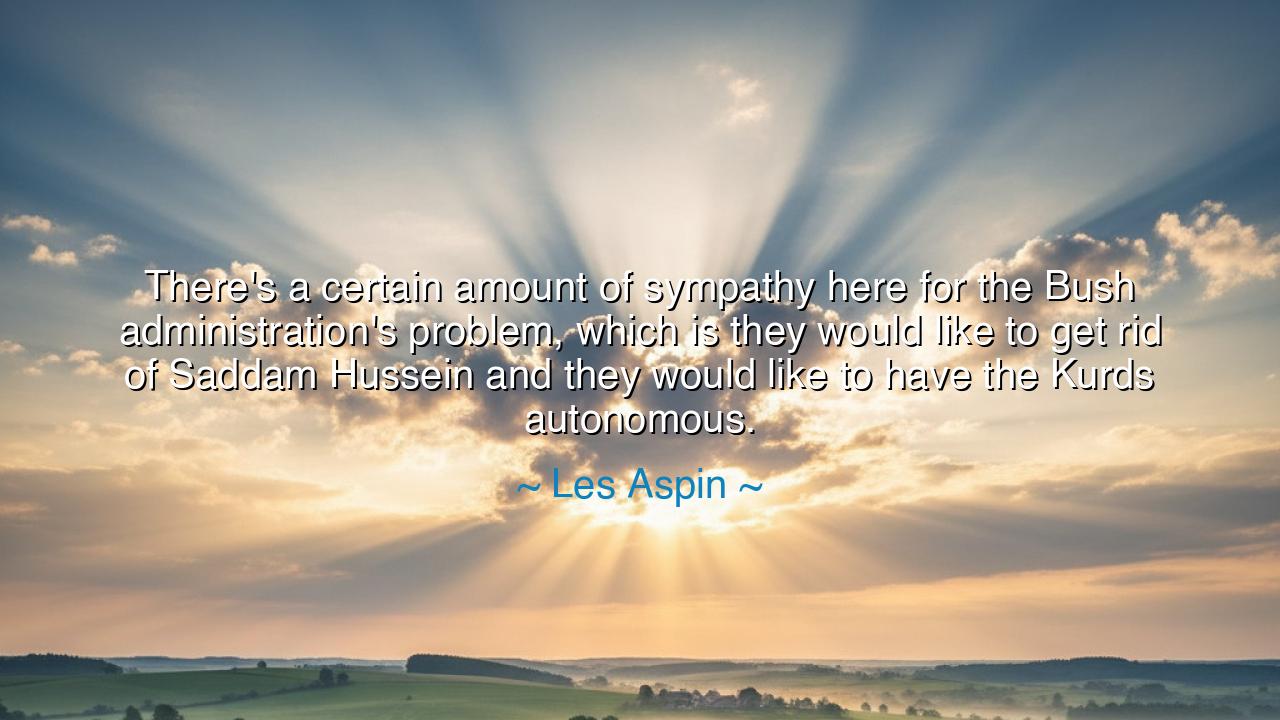
There's a certain amount of sympathy here for the Bush
There's a certain amount of sympathy here for the Bush administration's problem, which is they would like to get rid of Saddam Hussein and they would like to have the Kurds autonomous.






Hear the words of Les Aspin, statesman and Secretary of Defense, who spoke in the turbulent years when the Middle East lay in fire and uncertainty. He declared: “There’s a certain amount of sympathy here for the Bush administration’s problem, which is they would like to get rid of Saddam Hussein and they would like to have the Kurds autonomous.” These words reveal the ancient and recurring dilemma of rulers: the desire to balance justice with power, and compassion with the hard iron of political reality.
When Aspin speaks of sympathy, it is not the soft emotion of idle hearts, but the recognition of an impossible burden. The Bush administration sought two noble aims: the removal of a tyrant whose hand was heavy on his people, and the granting of autonomy to the Kurds, a people long oppressed, whose yearning for freedom had burned for generations. Yet noble aims often stand at odds with the realities of war, alliance, and strategy. Aspin’s statement acknowledges this truth—that even when we understand the righteousness of a cause, the path to achieve it is tangled and perilous.
The origin of his words lies in the aftermath of the Gulf War of 1991. Saddam Hussein, though driven from Kuwait, still ruled Iraq with cruelty. The Kurds, emboldened by his defeat, rose up in rebellion, dreaming of self-rule. Yet when they faced Saddam’s wrath, the United States hesitated, bound by the constraints of regional stability and the limits of intervention. Sympathy for the plight of the Kurds was real, but sympathy alone could not topple a dictator nor redraw the maps of nations. Thus Aspin gave voice to the eternal conflict between ideals and the unforgiving nature of geopolitics.
History is rich with such lessons. Recall the plight of the Poles in the Second World War. The Allies spoke with sympathy for their suffering under Nazi and Soviet boots, yet at Yalta, their autonomy was sacrificed for the larger balance of power. The leaders of that age, like the leaders of Aspin’s, carried hearts that felt compassion but hands that were bound by strategy. Here again we see that sympathy without strength or clear path becomes sorrow, and noble desires often falter on the jagged stones of reality.
The deeper meaning is this: leaders are not judged only by their emotions, but by their ability to act wisely amidst impossible choices. To feel sympathy is necessary, for without it, governance becomes tyranny. But to govern by sympathy alone is folly, for the world is a battlefield of competing interests, and compassion must be joined with foresight and discipline. Aspin, in his words, teaches us that it is not enough to want freedom for the oppressed or justice for the downtrodden—we must also reckon with the costs, the risks, and the forces that resist.
Beloved listener, learn from this truth in your own life. To feel sympathy for a friend, a family member, or even a stranger is noble, but sympathy must be married to wisdom. If you rush to rescue without thought, you may be crushed by the very burden you seek to lift. If you wish to help, ask also: How can I do so in a way that strengthens, rather than weakens? How can I act without causing greater harm? This balance is the same for nations as for individuals.
Therefore, walk with both heart and mind. Let your sympathy be strong, but let your wisdom be stronger still. Aspire, as leaders must, to hold compassion in one hand and prudence in the other. For the greatest victories are won not by feeling alone, nor by cold calculation alone, but by the uniting of both.
Thus the words of Les Aspin endure as teaching: that noble aims often face impossible roads, and that to live wisely we must honor both our compassion and our reason, lest we falter between the two.






AAdministratorAdministrator
Welcome, honored guests. Please leave a comment, we will respond soon